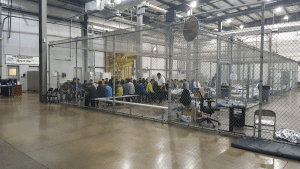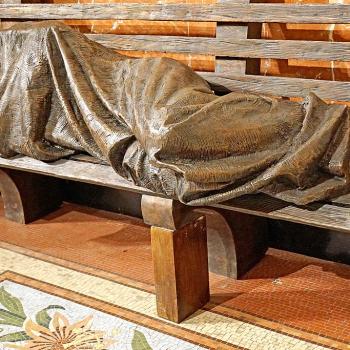
In Gaudium et spes, the second Vatican Council made a list of several infamies which degrade humanity and human dignity, including, but not limited to, deportations:
Furthermore, whatever is opposed to life itself, such as any type of murder, genocide, abortion, euthanasia or wilful self-destruction, whatever violates the integrity of the human person, such as mutilation, torments inflicted on body or mind, attempts to coerce the will itself; whatever insults human dignity, such as subhuman living conditions, arbitrary imprisonment, deportation, slavery, prostitution, the selling of women and children; as well as disgraceful working conditions, where men are treated as mere tools for profit, rather than as free and responsible persons; all these things and others of their like are infamies indeed.[1]
Mistreatment of strangers, of foreigners, has always be a crime which cries up to heaven. “Thus says the LORD of hosts, Render true judgments, show kindness and mercy each to his brother, do not oppress the widow, the fatherless, the sojourner, or the poor; and let none of you devise evil against his brother in your heart” (Zech. 7:9-10 RSV). Deportation of sojourners, of migrants seeking refuge, as well as making it difficult for such refugees to receive needful asylum, demonstrate an abusive anti-human ideology is at play, an ideology which leads to death and destruction if it is not put into check.
Sadly, many political powers in the world seek not the common good, but rather, the good of a particular elite, an elite which feels threatened when the common good, the good of their neighbor, is promoted. This is especially true in the United States. With another tweet, President Trump indicated that he plans to have “millions” of “illicit” immigrants deported. While it is difficult to know whether or not he actually will do as he said, it would not be surprising if he actually does as he threatened, because it is consistent with his actions in the past. The degradation of refugees and other migrants, especially innocent children, cries up to heaven; the facilities which have been used to detain such migrants represents a grave turn against the common good.
Though we might not like hearing it, those facilities which are used to detain migrants can be called concentration camps. While the history of concentration camps calls to mind the mass executions of the Jews, Gypsies, homosexuals, and others during World War II, it must be said, not all concentration camps lead to such executions: a concentration camp, according to Webster’s, is “a place where large numbers of people (such as prisoners of war, political prisoners, refugees, or the members of an ethnic or religious minority) are detained or confined under armed guard…” The inhumanity of concentration camps is bad enough, but when it becomes accepted and normalized, then the dehumanization can lead to worse treatment of those within the camps, including mass deaths (directly by execution, indirectly by poor health treatment for those in the camps).
Pope Francis understood what was going on when he called other such centers, in Europe, to being concentration camps. In an interview he gave returning to Rome from Egypt in 2017, he made it clear that we should understand what is going on, that concentration camps are once again being used:
It wasn’t a lapsus linguae: there are refugee camps that are true camps of concentration. There may be one in Italy, one elsewhere… Not in Germany, certainly. But think of this: what do people do who are closed in a camp and unable to leave? Think of what happened in northern Europe when they wanted to cross the sea to reach England: they were closed in! I was amused, and this is a little bit of Italian culture, I was amused to learn about a refugee camp in Sicily – and I’ve been told this by the delegate of Azione Cattolica in Agrigento – in that area there are two or three such camps, I don’t know in which diocese. The authorities of the city which houses the camps spoke to the people in one refugee camp and said: “You staying in here inside will affect your mental health; you must come out. But please, don’t get up to any rough stuff. We can’t open the door, but we’ll make a small hole behind. You go out, have a nice walk…”. In this way the refugees struck up relationships with the people living around the area, good relationships… These refugees do not commit acts of delinquency or crime. But the fact of being shut in, with nothing to do, this is a lager camp, is it not? But it has nothing to do with Germany, no, no. Thank you.[2]
Never again should this be. Never again should we allow mass confinement be used to dehumanize and destroy the dignity of others. Never again. We have, as a society, said never again for decades, but alas, we have forgotten the lessons of history, and now, in this age of Trump, we must say never again and put a stop to the evil which lies before us. Never again must be more than words. Never again must be put into action.
In our time, in the age of Trump, we are being put to a test: do we really mean never again? In the age of Trump, as with every age, we must say yes, we mean never again. But we must do more than say it. We must resist the dehumanization which lies before us.
Would-be immigrants need to always be protected; their rights cannot be ignored. When dealing with them, their would-be host countries must treat them humanely. The needs of the migrants, and not just the wants of governmental authorities, must be kept in mind when policy decisions are made. In explaining this, Pope Benedict XVI said:
Asylum seekers, who fled from persecution, violence and situations that put their life at risk, stand in need of our understanding and welcome, of respect for their human dignity and rights, as well as awareness of their duties. Their suffering pleads with individual states and the international community to adopt attitudes of reciprocal acceptance, overcoming fears and avoiding forms of discrimination, and to make provisions for concrete solidarity also through appropriate structures for hospitality and resettlement programmes. All this entails mutual help between the suffering regions and those which, already for years, have accepted a large number of fleeing people, as well as a greater sharing of responsibilities among States.[3]
It can be a challenge. Justice must work for the sake of all. Christians, likewise, must understand the present situation is a test of their spiritual resolve. Will they follow God and his expectations, being the salt of the earth or will they further move themselves away from the dictates of love and risk losing their saltiness? “For this reason, the presence of migrants and refugees – and of vulnerable people in general – is an invitation to recover some of those essential dimensions of our Christian existence and our humanity that risk being overlooked in a prosperous society. “[4]
With concentration camps once again being used, we must ask, do we really mean never again when we say it? Alas, in the age of Trump, it seems we do not.
[1] Gaudium et spes. Vatican translation. ¶27.
[2] Pope Francis, “Apostolic Journey to Egypt: Return Flight Press Conference of His Holiness Pope Francis from Egypt to Rome” (Apr. 29, 2017).
[3] Pope Benedict XVI, “Message For the World Day of Migrants and Refugees,” (Sept. 21, 2011).
[4] Pope Francis, Message 2019 World Day of Migrants and Refugees.
Stay in touch! Like A Little Bit of Nothing on Facebook.
If you have liked what you read, please consider sharing it with your friends and family!













